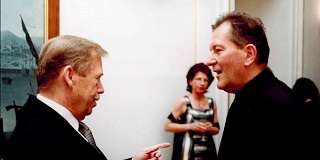|
Back
Words of a Solon New York
El Barrio’s Artspace, 215 East 99th Street
05/19/2021 - & May 20, 2021
Petr Kotik: Observing With Variations #33 for solo guitar and alto flute (World Premiere) – Letters to Olga, for two narrators, winds and guitars
S.E.M. Ensemble: Ashley Robyn Patten, Zach Hendrickson (Narrators), Roberta Michel, Laura Cocks (Flutes), Sam Jones, Clint McLendon (Trumpets), Xander Naylor, Chris Nappi (Guitars), Troy Rinker (Bass guitar), Petr Kotik (Alto flute, Director/conductor)

V. Havel, P. Kotik (© Petr Kotik)
“No one can get really drunk on a novel or painting, but who can help getting drunk on Beethoven’s “Ninth’?”
Milan Kundera, from The Incredible Lightness of Being (1988)
“Communism was overthrown by life, by thought, by dignity.”
Václav Havel (1936-2011)
If Milan Kundera was the iconic writer of late 20th Century Europe, Václav Havel might have been the epitome of Plato’s philosophical ruler. Setting aside Plato’s totalitarianism, Havel was the voice of rationality, service and conscience. Like so many others, he served time in prison for opposing Czech communism. And like other incarcerated for their beliefs, he wrote his thoughts to his wife Olga, she replying with similar concepts.
Czech-American composer (and the founder of S.E.M. Ensemble) Petr Kotik has not exactly put those words to music. But his composition, Letters to Olga (more appropriately Letters to and from Olga) uses the words of Havel and his wife as both background and foreground of his near-hour composition last night, Ashley Robyn Patten and Zach Hendrickson at opposite sides of the stage surrounding the chamber orchestra gave heartfelt feelings to these words. They never sung or even changed their intonation. Yet as in a similar work, Schoenberg’s A Survivor from Warsaw, the pair gave special character to these words. They spoke together, or followed each other canonically. They spoke with normal inflections or spoke them syllable by syllable. No word-singing but one felt that the narration wasn’t quite normal, that it was stylised for the occasion.
One had no problem with this. In fact, had Messrs Patten and Hendrickson performed without any music, the words might have had the “drunkenness” with which Kundera wrote above.
Mr. Kotik, though, offered the sonorities of singular instruments to and between the dialogues. He admits to revelling in sonorities, and few could be as dissimilar as the voices of two flutes, two trumpets, two normal guitars and one bass guitar, all conducted by the composer.
Initially, the effects were ravishing. The guitars twanged and voiced sforzandi chords. The flutes were beautiful in themselves, whether solo or in pairs. Most stunning were the two trumpets. Their pairing–in empty fifths and empty fourths–struck me first as a return to 13th and 14th Century music. Only later did I realize that they were, probably coincidentally, quoting the brass opening and closing of Janácek’s Sinfonietta. This, though, was stunning music.
Stunning to start with. Two probems erupted. First, that the music had no relationship to the words of the narrators. Mr. Kotik is an accomplished composer, and one had no doubt his personal auditory vision pictured a relationship. That, though, belonged to him. Ir never communicated to this listener. But this was not atonal. Rather, each section had a personality which seemed to live with the music.
Then again, poetry, drama, libretto can easily be paired with music. Epistolary words, even in the hands of John Adams’ Doctor Atomic, rarely make their mark.
The second problem, perhaps only with this listener, was the length. Fifty-odd minutes is...well, lengthy under any circumstances. Here, no matter how well played (and S.E.M. players are faultless), Letters to Olga lost its allure and became almost interminable.
One couldn’t make that criticism with the opening Observing With Variations #33, written in memory of Morton Feldman whose own guitar manuscript was lost. Here, Mr. Kotik took his solo The Lost Guitar for guitar and added his own alto flute. Both he and guitarist Xander Naylor gave a splendid “game off opposites”, copying each other playing against themselves, and offering unique sonorities.
That piece had the benefits of brevity. As for Letters to Olga, methinks Mr. Kotic was inspired by Havel’s words in the composition itself: “Art in general is a little like playing with fire; the artist deals with something without knowing precisely what it will "mean." The work, it seems to me, should always be somehow "wiser" than its author.”
Harry Rolnick
|